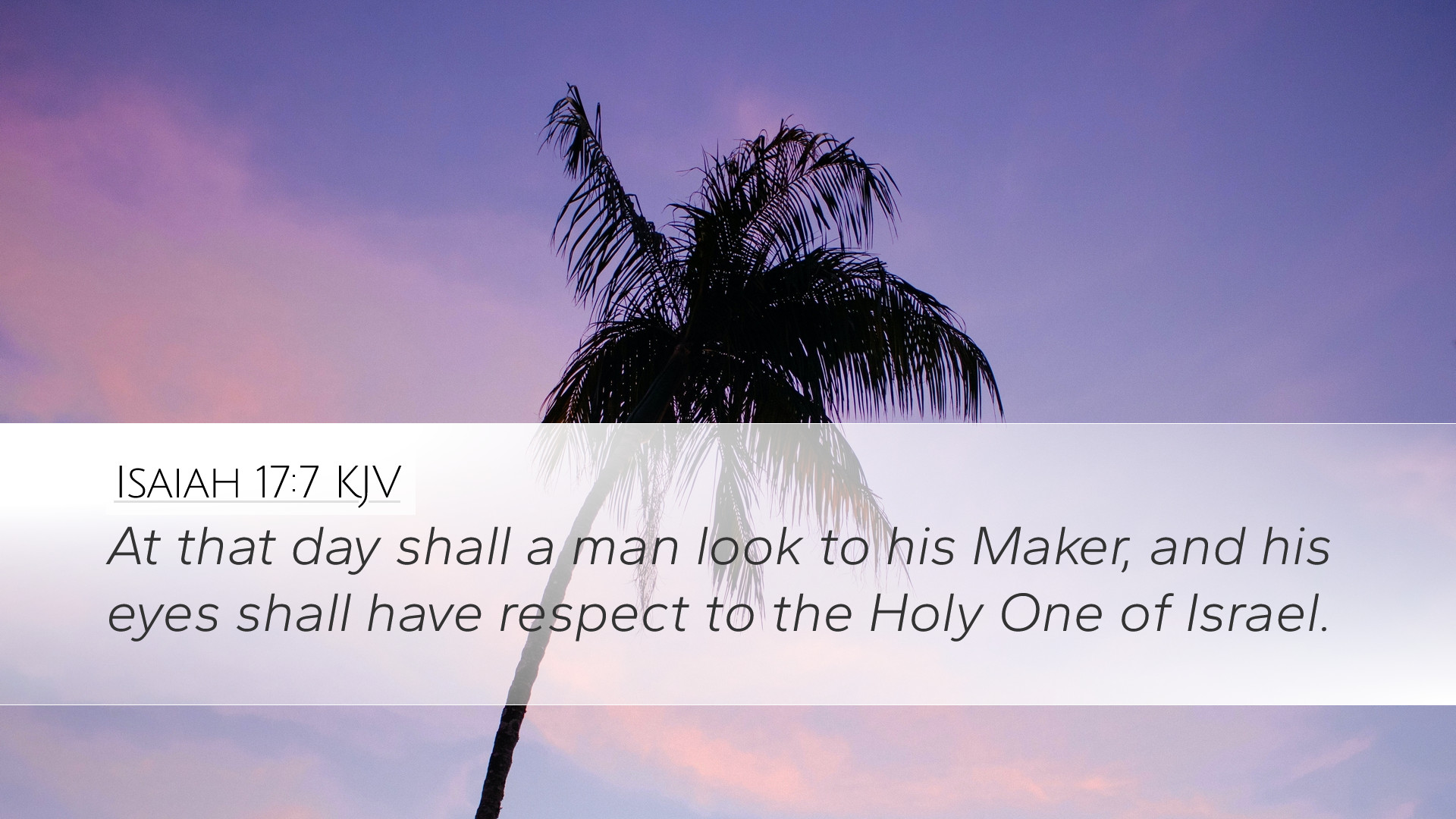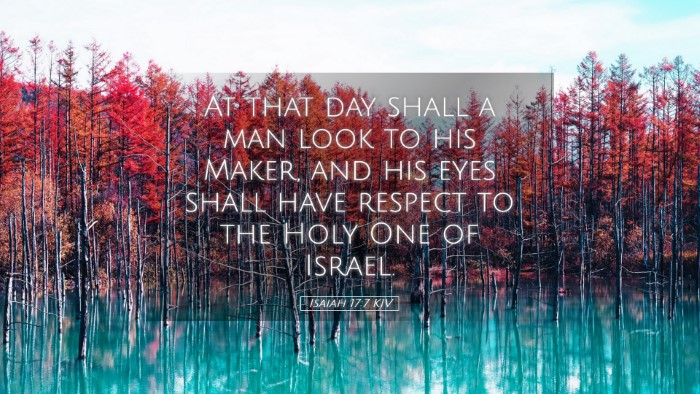Isaiah 17:7 - A Commentary
Isaiah 17:7 states: "In that day shall a man look to his Maker, and his eyes shall have respect to the Holy One of Israel." This verse introduces a profound shift in focus, emphasizing the necessity of looking towards God amidst calamity and uncertainty.
Contextual Background
The context of this verse relates to the impending judgments against Damascus and Israel. The surrounding nations were falling to calamity due to their turning away from God. Isaiah is revealing a time when the people, in their distress, would turn back to their true Source of hope and salvation.
Matthew Henry's Insights
- Recognition of God: Henry emphasizes that this verse points towards an acknowledgment of God as the ultimate source of deliverance. In times of turmoil, people are reminded that it is their Maker who must be sought after.
- Turning Back: He notes that this turning back is both a literal and a metaphorical necessity, where individuals must revisit their relationship with God, as their previous reliance on worldly supports will fail them.
- Spiritual Need: Henry suggests that this highlights the inherent spiritual need within every human, which often gets neglected until crises prompt a reevaluation of one’s faith and priorities.
Albert Barnes' Commentary
- Impending Calamity: Barnes explains that this verse reflects the consequences of the judgments about to be faced by Israel. The people will realize that only in turning to God can they find solace and strength.
- Introspection: He notes that the phrase "a man look to his Maker" indicates a personal and individual recognition of God's sovereignty. Each person must engage in introspection about their relationship with the Creator.
- Holy One of Israel: Barnes emphasizes that referring to God as the "Holy One of Israel" underscores His purity, righteousness, and the special covenant relationship He maintains with His people, reminding them of the need for holiness.
Adam Clarke's Interpretation
- The Day of Reckoning: Clarke elaborates on the notion that this verse speaks about a specific time when the people will come to terms with their situation. It is a moment of clarity where they acknowledge their errors.
- Eye to the Maker: He stresses the significance of "his eyes shall have respect to" - that is, the focus must shift away from idols and false dependencies back to God, who is the source of all wisdom and strength.
- Hope in Despair: Clarke posits that this verse offers great hope. It shows that, regardless of the surrounding devastation, individuals can find assurance by turning back to their Maker, thereby restoring their faith and relationship with God.
Theological Insights
From the combined insights of these scholars, several theological themes emerge:
- Repentance: This verse calls for a communal and individual repentance. The turning back to God is foundational in the life of faith.
- Divine Providence: All commentaries arrive at the understanding that God remains sovereign over the tumultuous events surrounding His people. He is the Maker, and recognizing His authority is crucial in times of distress.
- Hope and Restoration: Finally, the underlying theme is one of hope. Biblical prophets often point towards the faithfulness of God to restore those who genuinely turn towards Him.
Application for Modern Readers
For pastors, students, theologians, and scholars, Isaiah 17:7 serves as a powerful reminder of the importance of looking towards God during crises. Here are a few reflections:
- Encouragement to Seek God: In times of personal or communal challenges, this verse encourages believers to look to God, echoing a message of hope that resonates through the ages.
- Fostering a Relationship with the Holy One: It challenges believers to cultivate their relationship with God actively, ensuring they have the right perspective when trials come.
- Community Reflection: This verse can be a catalyst for preaching and teaching that prompts congregations to engage in corporate repentance and acknowledgment of God's sovereignty.
Conclusion
Isaiah 17:7 encapsulates a profound truth of the need to rely on God in all stages of life, especially during trying times. The insights from Matthew Henry, Albert Barnes, and Adam Clarke enrich our understanding and emphasize the importance of a return to God as our Maker and the Holy One of Israel. This call is timeless, urging every generation to seek refuge and hope in the divine amidst the challenges of life.


